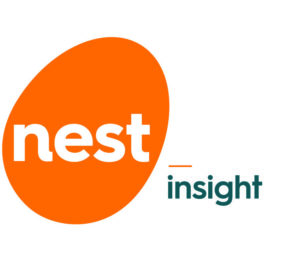Read the report: Responsible investment as a motivator of pension engagement – stage two research (PDF)
- Keep pension communications straightforward and personalised to encourage first time engagement from automatically enrolled savers.
- Responsible investment messages can be more effective among those who say ESG issues are very important.
- Talking to savers about responsible investment can help build confidence, increase awareness that pension savings are invested, and build trust in pensions and scheme providers.
New research published today by Nest Insight challenges the commonly held view that talking to disengaged pension savers about responsible investment and environmental, social and governance (ESG) issues could be a widely effective way to prompt people to engage for the first time.
Whilst findings from research surveys have concluded that the approach could be powerful, to date there has been limited real-world evidence on how people’s stated intentions translate into actual behaviours. The research, supported by Legal & General Investment Management (LGIM), explored whether responsible investment communications can engage pension savers, who have never logged into their pension account, more effectively than standard approaches. Through a behavioural email messaging trial conducted with 35,000 unregistered contributing Nest members, the real-life impact on engagement levels was assessed by measuring open rates, click through rates, and account registrations.
Keep messages simple and focused on the ‘call to action’ to drive first time engagements
The research found that a standard account activation email, with no mention of investment or responsible investing, resulted in higher open and click through rates, and the strongest impact on member registrations, regardless of age, gender, salary or employment industry, when compared with emails talking about responsible investment in different ways.
These findings suggest that care should be taken with communications about responsible investment, depending on the target audience and the engagement objective. For a disengaged audience, a straightforward message, or personalised communication, may be more effective to prompt people to engage with their pension account for the first time.
The opportunity cost of using a less engaging message to prompt account activation could be high
The research findings suggest that the first step in the engagement journey, in which people are encouraged to log into their account for the first time, could be an important door opener to other engagement and action. Among those who registered their account in the month following the trial:
- 88% said they knew how much they contributed to their pension, compared to 74% of those who did not register their account.
- 80% said they knew how much their employer contributes to their pension each pay period, compared to 69% of those who did not register their account.
- 52% said they knew how much they will have saved in their pension(s) by the time they retire, compared to 34% of those who did not register their account.
- 69% said they knew the current size of their pension pot, compared to 40% of those who did not register their account.
- 42% said they knew how their pension pot is invested, compared to 27% of those who did not register their account.
To encourage members to take actions that can have a positive impact on their retirement savings, test and learn trials like this can help schemes to pick the most effective messages for different target groups.
Three instances found where responsible investment messaging has an important role to play
Learnings from this trial show encouraging evidence of three occasions when messages about responsible investment may have a role to play in reaching out to disengaged pension scheme members:
- To drive engagement among people who say they care about ESG issues: Among pension savers who say that ESG issues are very important to them, the research findings indicate that a responsible investment message can be more effective.
- To help people engage with the concept of investment or build awareness that pension savings are invested. If the objective is to raise awareness that pension savings are invested for long-term growth, a message describing how savings are responsibly invested may be more powerful than talking to pension savers about their money being invested in assets like shares and property to help it grow.
- To build trust in pensions and scheme providers: Those who opened an email that included specific examples of how addressing ESG issues in investment strategy can lead to better outcomes for scheme members, were the most likely to give a high score when asked how much trust they had in their pension provider. People who opened this email also displayed higher confidence in their knowledge about their pension than the other groups.
Jo Phillips, Director of Research and Innovation at Nest Insight, comments:
“Our research findings suggest that there could be quite a wide gap between the pension industry’s interest in talking about ESG and the current appetite of some scheme members for hearing about it. However, it’s important to remember that the emails tested in this trial were designed to prompt the very first engagement among an unengaged group of pension savers. It’s quite possible that we’d see different results among savers who are further along their retirement saving engagement journey.
“It’s also clearly true that some people are highly motivated by ESG issues, and awareness of the relevance of these to pension saving is growing. If communications can be tailored and targeted to those who care about ESG issues, then the research indicates that these messages could indeed be effective. But personalisation is key. Information about responsible investment should be shared with those who want to find out more, but in a way that isn’t daunting or off-putting for others.
“There are many outstanding questions around what role responsible investment could play as a motivator of pensions engagement. We need to better understand how the patterns we saw in this trial might vary in different settings, such as with different target audiences, in the context of different schemes and at different touchpoints. We’re keen to explore this further as our research programme develops.”
Stuart Murphy, Co-Head of DC at Legal & General Investment Management, said:
“As an industry we have a critical responsibility to find ways to educate, support and empower our members on the benefits and impact of their pensions savings on society. This research shows that we must adapt the way we talk to members, using straightforward language, and focusing on subjects that matter to them.
“While terms like ESG and responsible investment may not always spark initial interest with members, we know they want to feel consulted about how their retirement funds will shape corporate activity, society at large and how it can make a real difference to the planet.
“At a time when DC pensions need more voluntary contributions, more understanding and in general more interest from members – it is clear that we, as an industry, need to do better in tailoring the way we communicate to ensure that we encourage them to fully engage with their pensions.”
ENDS
Notes to editors
About the research
View the report: Responsible investment as a motivator of pension engagement – stage 2 research (PDF)
First stage research
The first-stage exploratory research used three methodologies to identify recommendations on how best to communicate ESG factors to drive engagement and developed a set of messages:
- Desk research: A review of relevant communications from across different industries and existing studies on whether talking about ESG can drive pension savers’ behaviours.
- Expert interviews: Speaking to 8 experts from a range of sectors about their experience communicating with customers and the public about sustainability and ethical issues – focusing on what works and what to avoid.
- Member surveys: A survey of 255 members of Nest’s member research community about their pensions engagement and attitudes towards ESG issues and responsible investment. A set of email mock-ups and messages were also tested to see which they said was most relevant and appealing to them.
Read the stage one research report (PDF)
Second stage research
The second stage of the research programme drew upon the learnings from the stage one exploratory work to test the messages developed in a real-world setting through an email-based randomised controlled trial with 35,000 unregistered contributing Nest members. Four different emails were tested, each one with the same visual design and call to action to ‘log in to your Nest account’:
- Savings email: a standard activation email which referred to the money held in the pension as ‘savings’.
- Investment email: which talked about their money being invested in things like shares and property to help it grow for them over the long term.
- General responsible investment email: which talked about Nest’s responsible investment strategy, highlighting how their money is invested responsibly for the long term.
- Specific responsible investment email: which included the same information as the general responsible investment email, but also gave specific examples of how Nest encourages companies to act sustainably, for example by tackling climate change, building affordable housing and treating workers fairly.
A fifth group received no emails to create a control group for comparison.
About Nest Insight

Nest Insight is a collaborative research unit set up by Nest Corporation to help understand and address the challenges facing Nest members and other defined contribution savers. For more information visit: nestinsight.org.uk
About our programme partner, Legal & General Investment Management (LGIM)

Legal & General Investment Management (LGIM) is the asset-management arm of Legal & General Group. Their purpose is to create a better future through responsible investing. They strive to achieve this through a strong sense of partnership with their clients, working together to achieve positive long-term outcomes. LGIM draw on industry-leading expertise to innovate constantly across public and private assets, index and active strategies. And they are a responsible investor, rising to the challenges of a rapidly changing world. On behalf of savers, retirees and institutions worldwide, LGIM manage £1.2 trillion in assets.* For more information, visit: lgim.com/uk
*LGIM internal data as at 30 June 2020. The AUM disclosed aggregates the assets managed by LGIM in the UK, LGIMA in the US and LGIM Asia in Hong Kong. The AUM includes the value of securities and derivatives positions. The value of an investment and any income taken from it is not guaranteed and can go down as well as up, you may not get back the amount you originally invested.
About Nest Insight’s strategic partners
![]()
Invesco is an independent investment management firm dedicated to delivering an investment experience that helps people get more out of life. Building on its strong track record in defined contribution research, and its existing partnership with the University of Cambridge Judge Business School, Invesco partnered with Nest Insight to support its ambitious programme of research, publications and events. For more information, visit: invesco.co.uk NYSE: IVZ
![]()
BlackRock is a global investment manager serving the UK market for more than 30 years with a purpose to help more and more people experience financial well-being. BlackRock’s Emergency Savings Initiative is made possible through philanthropic support from the BlackRock Foundation. The initiative brings together partner companies and non-profit financial health experts to make saving easier and more accessible for low- to moderate-income people across the US and UK, ultimately helping more people to establish an important financial safety net. For more information, visit blackrock.com/corporate/about-us/social-impact







